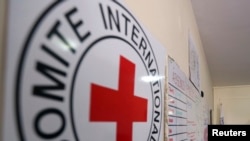A worker with the International Committee of the Red Cross (ICRC) was shot and killed over the weekend when a convoy of their vehicles traveling in former Western Equatoria was ambushed.
ICRC driver Lukudu Kennedy Laki Emmanuel was killed when nine trucks and a four-wheel-drive vehicle were shot at by unknown assailants when returning from Western Equatoria Friday. When Emmanuel was shot, his vehicle spun out of control and crashed.
“We are shaken and distraught by the killing of our colleague who was traveling in a convoy of vehicles,” Francois Stamm, ICRC's head of delegation in Juba, said in a statement.
The ICRC condemned the attack and suspended all operations in the area indefinitely. ICRC spokesperson in Juba Mari Aftret Mortvedt said all activities are on hold in the area until the agency learns what happened.
“The convoy was marked with the Red Cross emblem which is ICRC protection in areas of conflict and we need to understand why it was not respected,” said Mortvedt.
The convoy was returning from a food and seed distribution operation in the former Western Equatoria near the borders of Central African Republic and the Democratic Republic of Congo.
Before ICRC teams embark on any travel in South Sudan, they notify all parties to the conflict about their presence, according to Mortvedt.
“The next time we go on these roads, we (must make sure we) are respected and the Red Cross emblem is respected. We encourage all parties not to attack humanitarian workers because it's important for us that we get access and safe passage to help the people in need in South Sudan,” said Mortvedt.
Mortvedt said this is the first serious attack on an ICRC convoy since the South Sudan conflict broke out in late 2013.
South Sudan became independent from neighboring Sudan in 2011 following decades of conflict.
The new nation slid into civil war less than two years later, after President Salva Kiir fired his deputy, Riek Machar.
The conflict has often followed along ethnic lines, killing tens of thousands and forcing nearly a third of the population of 12 million to flee their homes, with Uganda alone hosting 1 million South Sudanese refugees.
So far this year, more than eight humanitarian convoys have been attacked and thirteen aid workers have been killed in South Sudan.
The UN warns that under international humanitarian law, attacks against humanitarian relief personnel may constitute war crimes.




